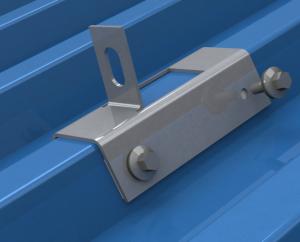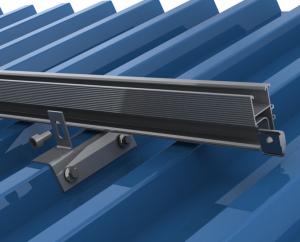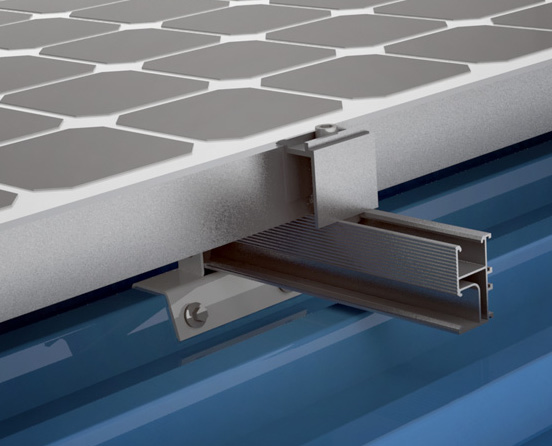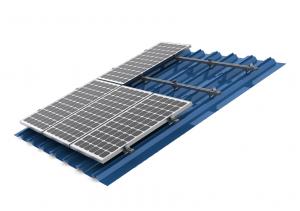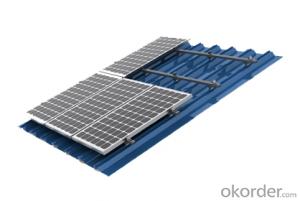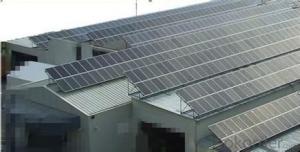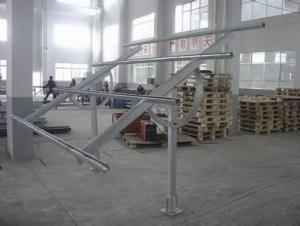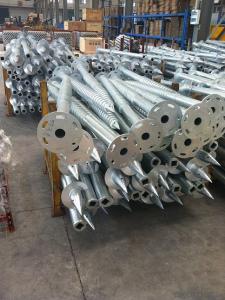Solar Energy Systems Swarthmore - Solar Mounting Metal Sheet Roof System
- Loading Port:
- China Main Port
- Payment Terms:
- TT OR LC
- Min Order Qty:
- -
- Supply Capability:
- -
OKorder Service Pledge
OKorder Financial Service
You Might Also Like
Product Features
• Less piece of components and easy for installation.
• Design speical clamp matching to the metal sheet shape and specification.
• Use super quality Al-alloy and stainless steel for components.
• Wide range of product line .
Technical Data
Installation site Metal sheet roof
Slope of roof Client requirement
Module specification Frame / frameless module, crystalline/thin film module
Installation type Parallel to the roof
Module arrangement Portrait Landscape
Module area square Client requirement
Module area position Client requirement
Roof structure Client requirement
Loading section Al 6063 T5
Small pieces Stainless steel, Al6063 T5
- Q: How does the efficiency of solar panels vary with temperature?
- The efficiency of solar panels typically decreases as temperature increases.
- Q: What is the impact of temperature fluctuations on the performance of solar panels?
- The performance of solar panels can be significantly affected by temperature fluctuations. When exposed to high temperatures, solar panels tend to become less efficient, resulting in a decrease in power output. This is mainly because the materials used in the panels, such as silicon-based photovoltaic cells, are sensitive to changes in temperature. One of the primary consequences of high temperatures is an increase in resistance within the solar panels. This higher resistance leads to a loss of electrical current flow, reducing the overall efficiency of the panels. Additionally, the semiconductor material in the panels can expand under high temperatures, potentially causing microcracks or other damage to the structure. This further diminishes the efficiency and lifespan of the panels. Conversely, extremely cold temperatures can also have a negative impact on the performance of solar panels. In cold conditions, the conductivity of the materials used in the panels decreases, resulting in higher resistive losses. Moreover, the accumulation of snow or ice on the panel surface can impede sunlight absorption, further decreasing power output. To counteract the effects of temperature fluctuations, solar panels are often equipped with thermal management systems. These systems help dissipate excess heat and maintain an optimal operating temperature range for the panels. Common techniques include the use of cooling fluids, heat sinks, or ventilation systems. By controlling the temperature, the performance and longevity of solar panels can be enhanced. It is important to note that although temperature fluctuations can impact the efficiency of solar panels, they still remain a viable and sustainable source of energy. Advances in solar technology, such as the development of more temperature-resistant materials and improved thermal management systems, continue to improve the performance and reliability of solar panels in different climate conditions.
- Q: Can solar energy systems be used in powering amusement parks?
- Yes, solar energy systems can definitely be used in powering amusement parks. Solar power has become increasingly popular in recent years due to its numerous benefits. Amusement parks require a significant amount of energy to operate rides, lighting, and other facilities. By utilizing solar energy systems, parks can reduce their reliance on traditional energy sources and significantly lower their operational costs. Solar panels can be installed on rooftops, parking lots, or open areas within the amusement park to harness the power of the sun. These panels convert sunlight into electricity, which can be used directly to power various park operations. Additionally, excess energy generated during peak sunlight hours can be stored in batteries for use during cloudy or nighttime periods. The advantages of using solar energy in amusement parks are manifold. Firstly, it is a renewable and sustainable energy source, meaning it does not deplete natural resources or produce harmful emissions. This makes solar energy an environmentally friendly choice, aligning with the growing emphasis on green initiatives and reducing carbon footprints. Furthermore, solar energy systems can provide a stable and predictable source of power. Amusement parks often experience high peak energy demands during busy periods, such as weekends or holidays. Solar panels can easily handle these fluctuations and ensure a reliable power supply, reducing the risk of power outages or disruptions. Moreover, installing solar panels can enhance the overall image and brand of an amusement park. By demonstrating a commitment to sustainable practices, parks can attract environmentally conscious visitors and differentiate themselves from competitors. This can contribute to a positive public image and potentially increase visitor numbers. In conclusion, solar energy systems can undoubtedly be used to power amusement parks. Their ability to generate clean, reliable, and cost-effective electricity makes them an ideal solution for powering the energy-intensive operations of amusement parks. By harnessing the power of the sun, parks can reduce their carbon footprint, lower operational costs, and enhance their overall appeal to visitors.
- Q: Can solar energy systems be used in powering retirement homes or assisted living facilities?
- Retirement homes and assisted living facilities can indeed utilize solar energy systems to power their operations. These facilities face a substantial energy demand for heating, cooling, lighting, and electrical appliances. However, by installing solar panels on rooftops or suitable areas, these facilities can generate their own electricity and decrease their dependence on the grid. The implementation of solar energy systems offers significant advantages for these establishments. One notable benefit is the potential for substantial cost reduction, as solar power can offset a significant portion of their electricity bills. This aspect is especially crucial for retirement homes and assisted living facilities, which operate on limited budgets and must allocate resources efficiently. By harnessing solar power, these facilities can redirect the saved funds toward providing enhanced care and services for their residents. Moreover, solar energy systems contribute to a cleaner and more sustainable environment. Retirement homes and assisted living facilities bear a responsibility to promote their residents' well-being, and the utilization of solar power enables them to reduce their carbon footprint. This environmentally friendly approach can positively impact the health and overall quality of life for the residents. Additionally, solar energy systems serve as a reliable power source during emergencies or power outages. In areas prone to extreme weather events, where power disruptions are frequent, having a solar energy system with battery storage ensures a continuous and uninterrupted power supply to critical areas such as medical equipment, lighting, and HVAC systems. In conclusion, solar energy systems offer a feasible and advantageous solution for powering retirement homes and assisted living facilities. These systems can significantly decrease operating costs, promote sustainability, and provide a reliable power source, ultimately enhancing the quality of care and services provided to residents.
- Q: Can solar energy systems be used in areas with limited access to healthcare facilities?
- Yes, solar energy systems can be used in areas with limited access to healthcare facilities. Solar energy can power medical equipment, refrigeration units for vaccines and medications, lighting for healthcare facilities, and other essential healthcare services. By providing a reliable and sustainable source of electricity, solar energy systems can help overcome the challenges of limited access to healthcare facilities in remote or underdeveloped areas.
- Q: Can solar energy systems be used in areas with limited grid infrastructure?
- Solar energy systems are indeed suitable for use in areas that have limited grid infrastructure. In fact, one of the key benefits of solar energy is its ability to supply electricity in remote and off-grid locations. By converting sunlight into energy, solar panels generate electricity without relying on a connection to the traditional power grid. This makes solar energy systems an ideal choice for remote areas like rural communities or developing regions, where it may not be financially or technically feasible to extend the grid infrastructure. Through the installation of solar panels and the use of energy storage systems like batteries, these areas can generate and store their own electricity, even when sunlight is scarce or during nighttime. This not only grants access to reliable and clean energy, but also fosters energy independence and resilience in regions with limited grid infrastructure. Moreover, solar energy systems can be easily adjusted in scale to meet the energy demands of the community, making them a versatile and sustainable solution for powering areas with limited grid infrastructure.
- Q: What is the role of charge controllers in a solar energy system?
- The role of charge controllers in a solar energy system is to regulate and control the flow of electricity between the solar panels and the batteries. They prevent overcharging of batteries by regulating the voltage and current, which helps prolong the battery's lifespan and ensures efficient and safe operation of the entire system.
- Q: Are there any maintenance requirements for solar energy systems?
- Yes, solar energy systems do have some maintenance requirements. These include regular cleaning of the solar panels to remove dirt and debris, checking for any damages or malfunctions, and ensuring proper electrical connections. Additionally, monitoring the system's performance and assessing its efficiency is necessary to ensure optimal functioning. Overall, while solar energy systems are low-maintenance compared to other energy sources, regular inspections and basic upkeep are essential for their longevity and effectiveness.
- Q: Can a solar energy system increase the value of my home?
- Your home's value can be increased by installing a solar energy system. Potential buyers view this as a valuable investment due to the financial and environmental advantages it offers. One benefit is that solar panels can significantly decrease or even eliminate your monthly electricity bills, which is appealing to prospective homeowners. This leads to long-term savings for the new owners, making the property more attractive. Additionally, solar panels are considered an eco-friendly and sustainable energy solution, which is becoming increasingly important to many homebuyers. As the world moves towards a more environmentally conscious future, properties with solar energy systems are seen as highly desirable and can attract a wider range of potential buyers. Studies have proven that homes with solar panels sell faster and at higher prices compared to similar properties without them. The Lawrence Berkeley National Laboratory conducted research that revealed homes equipped with solar panels typically sold for an additional $15,000 compared to those without solar. This demonstrates that solar energy systems can indeed increase the value of your home and provide a return on investment. It is important to consider various factors, such as the size and efficiency of the solar energy system, the local real estate market, and the overall condition of your property, as these will determine the extent of the value increase. Seeking advice from a real estate professional who specializes in sustainable homes can provide you with more precise information regarding the potential value increase of your home. In conclusion, installing a solar energy system can enhance your home's value by reducing energy costs, appealing to environmentally conscious buyers, and potentially selling at a higher price. With the increasing focus on renewable energy, investing in solar power can be a wise decision that not only benefits you financially but also contributes to a greener future.
- Q: How do solar energy systems impact wildlife habitats?
- Solar energy systems can have both positive and negative impacts on wildlife habitats. On one hand, they can help reduce greenhouse gas emissions and mitigate climate change, which can benefit many species by preserving their natural habitats. Additionally, solar installations can serve as a habitat for certain species, providing shelter and food sources. However, there are also potential negative impacts, such as the loss of vegetation and disruption of ecosystems during the construction and operation of solar farms. It is important to carefully plan and manage solar installations to minimize these impacts and ensure coexistence with wildlife habitats.
Send your message to us
Solar Energy Systems Swarthmore - Solar Mounting Metal Sheet Roof System
- Loading Port:
- China Main Port
- Payment Terms:
- TT OR LC
- Min Order Qty:
- -
- Supply Capability:
- -
OKorder Service Pledge
OKorder Financial Service
Similar products
Hot products
Hot Searches
Related keywords

